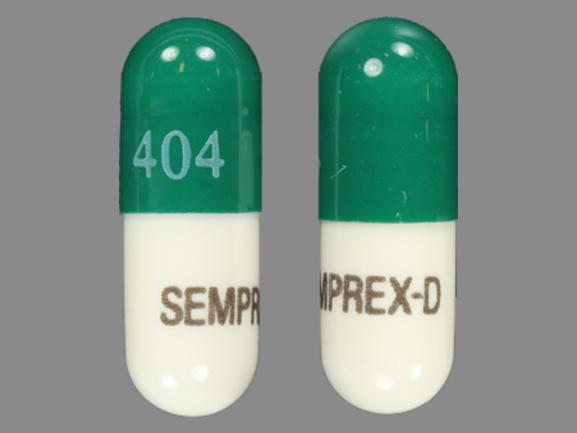Semprex-D Interactions
There are 489 drugs known to interact with Semprex-D (acrivastine/pseudoephedrine), along with 10 disease interactions, and 2 alcohol/food interactions. Of the total drug interactions, 29 are major, 453 are moderate, and 7 are minor.
- View all 489 medications that may interact with Semprex-D
- View Semprex-D alcohol/food interactions (2)
- View Semprex-D disease interactions (10)
Most frequently checked interactions
View interaction reports for Semprex-D (acrivastine / pseudoephedrine) and the medicines listed below.
- acetic acid topical
- aspirin
- atorvastatin
- Axiron (testosterone)
- Azelex (azelaic acid topical)
- bupropion
- Bystolic (nebivolol)
- captopril
- ciclopirox topical
- clobetasol topical
- clonazepam
- Colace (docusate)
- Crestor (rosuvastatin)
- cyclobenzaprine
- Demerol (meperidine)
- doxazosin
- doxycycline
- hydrocodone
- levothyroxine
- losartan
- Lyrica (pregabalin)
- Mucinex D (guaifenesin / pseudoephedrine)
- Nexium (esomeprazole)
- Nexium 24HR (esomeprazole)
- Nifedical XL (nifedipine)
- oxycodone
- prednisone
- Singulair (montelukast)
- tramadol
- Xanax (alprazolam)
Semprex-D alcohol/food interactions
There are 2 alcohol/food interactions with Semprex-D (acrivastine / pseudoephedrine).
Semprex-D disease interactions
There are 10 disease interactions with Semprex-D (acrivastine / pseudoephedrine) which include:
- cardiovascular disease
- renal dysfunction
- anticholinergic effects
- asthma/COPD
- cardiovascular
- GI narrowing
- PKU
- BPH
- diabetes
- glaucoma
More about Semprex-D (acrivastine / pseudoephedrine)
- Semprex-D consumer information
- Compare alternatives
- Reviews (11)
- Drug images
- Side effects
- Dosage information
- During pregnancy
- Drug class: upper respiratory combinations
Related treatment guides
Drug Interaction Classification
| Highly clinically significant. Avoid combinations; the risk of the interaction outweighs the benefit. | |
| Moderately clinically significant. Usually avoid combinations; use it only under special circumstances. | |
| Minimally clinically significant. Minimize risk; assess risk and consider an alternative drug, take steps to circumvent the interaction risk and/or institute a monitoring plan. | |
| No interaction information available. |
See also:
Further information
Always consult your healthcare provider to ensure the information displayed on this page applies to your personal circumstances.


